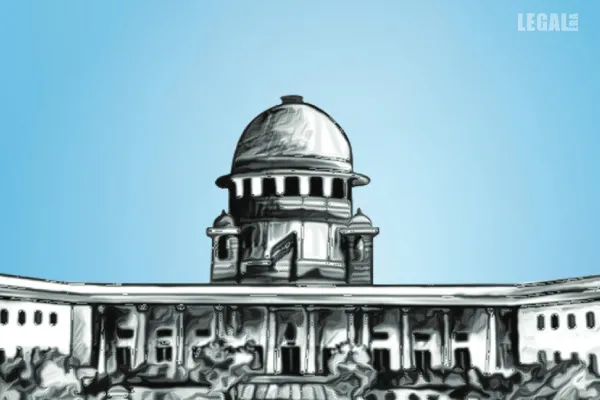Supreme Court: Banks Are Liable to Ensure Safety Of Lockers
The Supreme Court (SC) bench comprising of Justices Mohan M. Shatanagoudar and Vineet Saran, directed the Reserve Bank;

Supreme Court: Banks Are Liable to Ensure Safety Of Lockers The Supreme Court (SC) bench comprising of Justices Mohan M. Shatanagoudar and Vineet Saran, directed the Reserve Bank of India (RBI) to frame uniform rules and issue guidelines for all banks regarding locker management within six months. The Top Court in the case of Amitabha Dasgupta (Appellant) v. United Bank of India &...
Supreme Court: Banks Are Liable to Ensure Safety Of Lockers
The Supreme Court (SC) bench comprising of Justices Mohan M. Shatanagoudar and Vineet Saran, directed the Reserve Bank of India (RBI) to frame uniform rules and issue guidelines for all banks regarding locker management within six months.
The Top Court in the case of Amitabha Dasgupta (Appellant) v. United Bank of India & Ors. (Respondents) stated on 19 February 2021 that breaking open a locker without following the legal procedure would be construed as gross negligence on the part of the bank.
The SC noticed that the banks often took the line of defense that they were not liable as they were not aware of the contents of lockers. The Court further noted that the banks were not held liable according to previously decided cases before the National Consumer Commission and High Courts.
The factual background of the case is that the appellant was a joint holder with his deceased mother in a safe deposit locker opened at a bank. He was informed by the bank that the locker is broken for non-payment of locker rent dues and it was reallocated to another customer.
The appellant protested that such breaking of his locker by the Bank was illegal since he had cleared dues prior to the breaking of the locker. He moved before the District Consumer Forum (Forum) for seeking a direction to the United Bank of India to return the seven ornaments that were in the locker, or pay Rs 3,00,000 towards the cost of jewelry, and compensation for damages.
The Forum directed the bank to return the entire contents of the locker or pay the complainant Rs 3,00,000 towards the cost of the jewelry and Rs 50,000 as compensation for mental agony, harassment, and cost of litigation. It held that the bank's service was deficient and ordered costs of lost jewelry and compensation for mental agony, harassment, and cost of litigation.
An appeal was filed before the State Commission that reduced the amount of compensation awarded by the Forum and stated that the dispute on the contents of the locker can only be decided upon provision of elaborate evidence and the Consumer Forum is not equipped to undertake such evaluation. The National Commission upheld the decision of the State Commission.
The HC observed that the dominant view of Courts around the globe has been that the bank is in the position of a bailee concerning the goods placed inside the locker by the locker holder.
Issues before the SC
• Whether the Bank owes a duty of care to the locker holder under the laws of bailment or any other law for the contents of the locker? Whether the same can be effectively adjudicated in the course of consumer dispute proceedings?
• Whether the Bank owes an independent duty of care to its customers for diligent management and operation of the locker, separate from its contents? Whether compensation can be awarded for non-compliance duty?
An appeal was filed before the Apex Court that stated regarding the first issue that all questions of fact and law are left open before the Civil Court to decide on the merits of the case, including as to whether the law of bailment is applicable, or any other law as the case may be.
Regarding the second issue the Top Court stated that, as per the newly enacted Consumer Protection Act, 2019, banks owe a separate duty of care to exercise due diligence in maintaining and operating their locker or safety deposits system.
The bench observed that there is no substantive domestic legislation or sector-specific regulations which may throw light upon the issue of whether banks are responsible under the laws of bailment for the loss of articles placed inside the locker.
The RBI in its rules and guidelines did not specify the liability of banks in such a scenario. However, it issued certain directions to banks in 2007 regarding the imposition of their duty to take care regarding the protection of bank lockers and mandating transparency in the allotment and breaking open of the lockers. However, it was left to the individual banks to formulate the exact procedures for fulfilling this duty of care.
The SC directed the RBI to issue guidelines for banks in this regard and stated that "Banks as service providers under the Consumer Protection Act owe a separate duty of care to exercise due diligence in maintaining and operating their locker or safety deposit systems."
The Court added, "This includes ensuring the proper functioning of the locker system, guarding against unauthorized access to the lockers and providing appropriate safeguards against theft and robbery."
The SC bench mentioned in its order, "The very purpose for which the customer avails of the locker hiring facility is so that they may rest assured that their assets are being properly taken care of."
The Apex Court further emphasized that the banks cannot wash off their hands and claim that they bear no liability towards their customers for the operation of the lock. "If this is permitted then it will lead to a state of anarchy wherein the banks will routinely commit lapses in the proper management of the lockers, leaving it to the hapless customers to bear the costs," the bench observed.
The Judges stated that such actions of the banks would not only be a violation of the Consumer Protection Act but also damage investor confidence and harm the reputation of our emerging economy.
The bench said, "The banks as custodians of a public property cannot leave the customers in the lurch merely by claiming ignorance of the contents of the lockers." It added that the present state of regulations on locker management was found "inadequate and muddled".
The Court further said that the customers face threats in modern times with dual key-operated lockers giving way to digital lockers. Due to this, the customers are left at the mercy of the bank for the protection of their assets and the electronically operated lockers could face manipulation by miscreants.
The SC bench gave the RBI six months for laying down comprehensive directions mandating the steps to be taken by banks for a locker and safe deposit facility management.
The Court further stated that the banks should not have the liberty to impose unilateral and unfair means on the consumers. The Court directed the principles laid down in this judgment will be binding upon banks till the time the RBI lays the guidelines regarding this.
While disposing of the appeal the bench stated, "It is also left open to the RBI to issue suitable rules for the responsibility owed by banks for any loss or damage to the contents of the lockers, so that the controversy on this issue is clarified as well."





